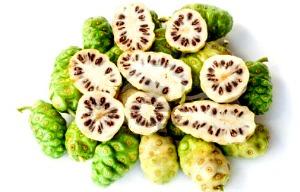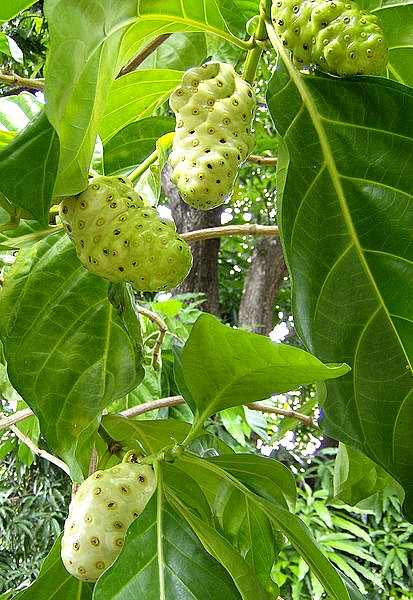 The Noni or Morinda plant (Morinda citrifolia) locally known as “apatot” is a tropical evergreen tree belonging to the coffee family (Rubiaceae). It is naturally found in the coastal areas of Polynesia, the South Pacific, New Zealand, Australia, Malaysia, India, the Caribbean Islands, South America and the Philippines. The plant has also been naturalized in other places like Hawaii.
The Noni or Morinda plant (Morinda citrifolia) locally known as “apatot” is a tropical evergreen tree belonging to the coffee family (Rubiaceae). It is naturally found in the coastal areas of Polynesia, the South Pacific, New Zealand, Australia, Malaysia, India, the Caribbean Islands, South America and the Philippines. The plant has also been naturalized in other places like Hawaii.
The potato-like fruit of noni is a staple food in some Pacific islands where it is eaten raw or cooked. It has a pungent odor and bitter taste when ripe. The green fruit, leaves and roots of the plant have been used in the traditional medicine of Polynesians for centuries in the treatment of menstrual cramp, bowel irregularities, diabetes, liver disease and urinary tract infection.
The fruit pulp of noni contains carbohydrates, dietary fibre, protein and fat. It is also rich in vitamins (A, C and niacin), minerals (potassium, calcium and sodium), amino acids, and antioxidants. Among the phytochemicals present in it are lignans, oligo and polysaccharides, flavonoids, iridoids, fatty acids, scopoletin, catechin, beta-sitosterol, damnacanthol and alkaloids.
Research at a French university has shown that noni has anti-inflammatory and analgesic properties that can reduce the pain caused by arthritis and joint discomfort. It has an antibacterial compound that can protect against infections and diseases. the presence of proxeronine in noni juice that becomes xeronine in the body helps to normalize abnormal cellular function particularly in the brain and stimulates the production of T-cells that are important for the immune system.
Researchers of the Department of Toxicology, University Medical School of Hamburg, in Germany say that consuming noni juice has a negligible risk. The European Food Safety Authority has approved the use of dried or roasted leaves of noni for tea infusions. By drinking an infusion of 1 gram of the dried leaves in 240 ml of hot water at 100ºC for ten minutes, the highest recommended daily intake of 18.4 mg/kg of body weight has no harmful effect, according to scientists.
While animal studies have shown the health benefit effects of noni juice, there is still insufficient evidence in humans. The side effects reported by those who are allergic or sensitive to it are belching, diarrhea, headache, mild rash, pimples and heavy menstruation in women. Consuming too much of noni juice can cause liver damage because of its high potassium content.

The morinda plant grows in open rocky or sandy shores and shady forests. Up to 725 seedlings can be planted in a hectare with at a spacing of 4×4 meters. The tree matures in 18-24 months and bears flowers and fruits throughout the year with good management. A tree can grow 9 meters high and bear 4-8 kilos of fruits per month. It is relatively free of pests and diseases.
In India where noni is extensively cultivated, an investment of around Php29,000 is needed per hectare and a net income oh Php22,500 per hectare is obtained. The yield per tree is 50-150 fruits that weigh 5-15 kilos each for more than 20 years with good farming. The ripe fruit that is white in color sells for Php5 per kilo and should be processed within 10 days from harvest for juice extraction. It takes 3 kilos of fruit to produce a liter of juice.
There are about 300 companies producing noni juice for the global market with an estimated value of US$ 2 billion per year. In the Philippines, there is at least one company based in Los Baños, Laguna producing noni juice from fruits that are harvested from wild trees in Quezon for the local and export markets.
Sources: Dr, Rafael D. Guerrero III, Agribusiness Digest, trc.dost.gov.ph; Photo: www.123rf.com, en.wikipedia.org